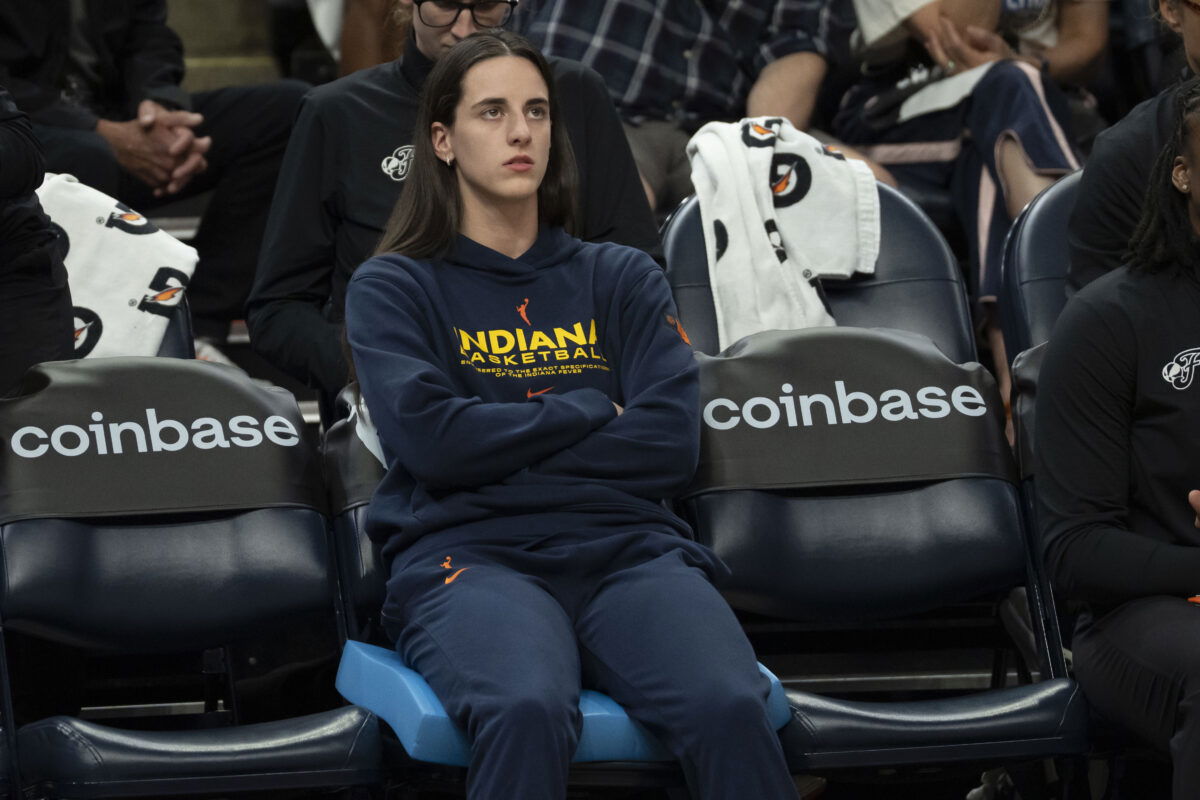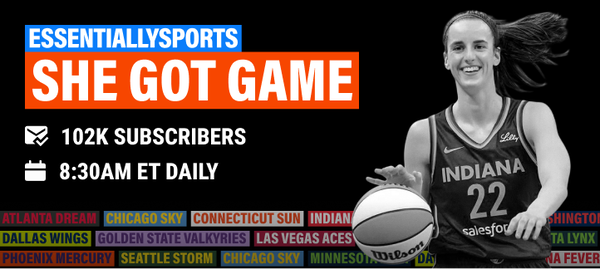
Imago
Jul 1, 2025; Minneapolis, Minnesota, USA; Indiana Fever guard Caitlin Clark (22) looks on against the Minnesota Lynx in the second half during the Commissioner’s Cup final at Target Center. Mandatory Credit: Jesse Johnson-Imagn Images

Imago
Jul 1, 2025; Minneapolis, Minnesota, USA; Indiana Fever guard Caitlin Clark (22) looks on against the Minnesota Lynx in the second half during the Commissioner’s Cup final at Target Center. Mandatory Credit: Jesse Johnson-Imagn Images

Imago
Jul 1, 2025; Minneapolis, Minnesota, USA; Indiana Fever guard Caitlin Clark (22) looks on against the Minnesota Lynx in the second half during the Commissioner’s Cup final at Target Center. Mandatory Credit: Jesse Johnson-Imagn Images

Imago
Jul 1, 2025; Minneapolis, Minnesota, USA; Indiana Fever guard Caitlin Clark (22) looks on against the Minnesota Lynx in the second half during the Commissioner’s Cup final at Target Center. Mandatory Credit: Jesse Johnson-Imagn Images
Last year, Caitlin Clark found herself celebrating a big night while quietly roasting her own paycheck. It happened during the Indiana Fever’s 92–75 win over the Seattle Storm, when Lexie Hull dropped 22 points with her grandma and twin sister cheering from the stands. After the game, a reporter jokingly asked Hull if it was time to buy season tickets for the family. Before Hull could even respond, Clark jumped in: “Those are pretty expensive.” Given that Clark was earning just over $76,000 as a rookie, the math checked out. She didn’t stop there either, adding: “It’s like our entire salary to get those. I’m not kidding. We need people to help.”
Watch What’s Trending Now!
Well, fast-forward nearly a year, and apparently, no one did. After Indiana defeated the Minnesota Lynx to clinch the Commissioner’s Cup, Clark once again had thoughts, and this time, she shared them live on Instagram, thanks to teammate Sydney Colson. “We get more for [winning the Commissioner’s Cup] than you do if you’re a [WNBA] champion. Makes no sense! Someone tell [WNBA commissioner] Cathy [Engelbert] to help us out. Cathy, help us out!” she said, as captured in an X post by @clrkszn. Clark isn’t wrong. The bonus for winning the Commissioner’s Cup outpaces the $20,000 players receive for taking home the WNBA championship. That discrepancy might leave anyone scratching their head.
Now, Clark inked a four-year deal worth $338,056, with the highest annual payout at $97,582, slated for her final year. But when you stack that up against Zaccharie Risacher, the NBA’s No. 1 pick in 2024, it gets laughable. He signed a four-year contract worth a whopping $57 million, with an average yearly income of $14.2 million. Try buying season tickets with that kind of difference. So, the players are done laughing. The WNBPA walked away from the last collective bargaining agreement, but the league’s recent counteroffer had even veterans like Breanna Stewart raising eyebrows and hell. And why wouldn’t they? In fact, the league’s latest proposal was described by Satou Sabally as “a slap in the face.” It’s no wonder more players are finding their voices and using them loudly.
One such player is ex-Chicago Sky and current Seattle Storm forward Gabby Williams. Speaking during an interview with Maria Clifton, Gabby brought to light that, despite being the most influential player in the league, Caitlin Clark is earning just $78K in her second year. She said, “ Fans love to talk about the publicity, the money that she’s bringing in, but the W is not even rewarding her. Like, she’s on that rookie contract making I think like 70K.” During the same interview, she also said that they also see the numbers and how much money the league is making, and the players aren’t.
After all, the W is no longer some niche side gig. It’s one of the fastest-growing professional sports leagues. Its stars helped secure an 11-year media rights deal worth $2.2 billion with Disney, NBC, and Amazon. That’s an average of $200 million a year starting next season. Not to mention, three new franchises in Cleveland, Detroit, and Philadelphia shelled out $250 million each in expansion fees. If this is a “loss-making league,” as it’s often portrayed, someone forgot to tell the investors clearly. And yet, salary growth remains capped at a modest 3% annually, terms set back when revenue streams were shakier. With the financial picture now a lot shinier, players are wondering: why hasn’t compensation grown in proportion?
Also, Gabby Williams didn’t hold back when criticizing the current state of the WNBA, especially in contrast to the booming NIL era in college sports. She pointed out that many rising stars are choosing to stay in school simply because they’re already making more money there than they would in the pros. And with that kind of financial security, the motivation to go pro early just isn’t what it used to be. So, remember when LeBron James posted on X in classic all-caps frustration: “I’m sitting here after watching the WNBA draft the other day and wondering WHY THE HELL do those young ladies have to stay in school for 4 years before being able to go pro??!!! I’m CONFUSED”? Well, for everyone echoing that confusion, Gabby Williams pretty much delivered the answer.
She further elaborated, “ I mean the proof was with NILs. As soon as we got marketed, the game all of a sudden grew. Like weird. Weird, as soon as we’re allowed to have marketability and visibility, now all of a sudden, everyone is making money. Interesting how that works, you got to put in money to make money.”
Exactly. With the calls coming from all directions, even Caitlin Clark’s agent, the league better listen if they don’t wish to run the risk of a lockout.
Can the League pay Caitlin Clark what she’s really worth?
Caitlin Clark’s agent, Erin Kane, isn’t shying away from addressing the elephant in the room. How little the WNBA pays its stars, including arguably the most influential rookie the league has ever seen. In an interview with ESPN, Kane, who represents Clark through Excel Sports Management, posed a blunt but necessary question: “Will Caitlin Clark ever be paid by the WNBA what she’s really worth to that league?” Her own answer was just as direct: “I don’t think that’s possible.”
Kane made it clear that this isn’t just about one player’s paycheck, but about a broader issue that affects the entire league. Clark, she said, is “part of a larger player body” that deserves better compensation across the board. “She should be recognized for what she has done and what she’s brought to the league from an economic standpoint. It’s as simple as that,” Kane emphasized.
And that says a lot. Just listen to what Unrivaled’s co-founder, Napheesa Collier, had to say. “My entire WNBA salary is what I just got in 30 minutes of playing one-on-one, which is insane to even say,” Collier said after securing the largest single-day prize in women’s basketball history as Unrivaled concluded.
So, what do you think? Will the upcoming meeting between the WNBA and the WNBPA during the All-Star game bring any relief?


